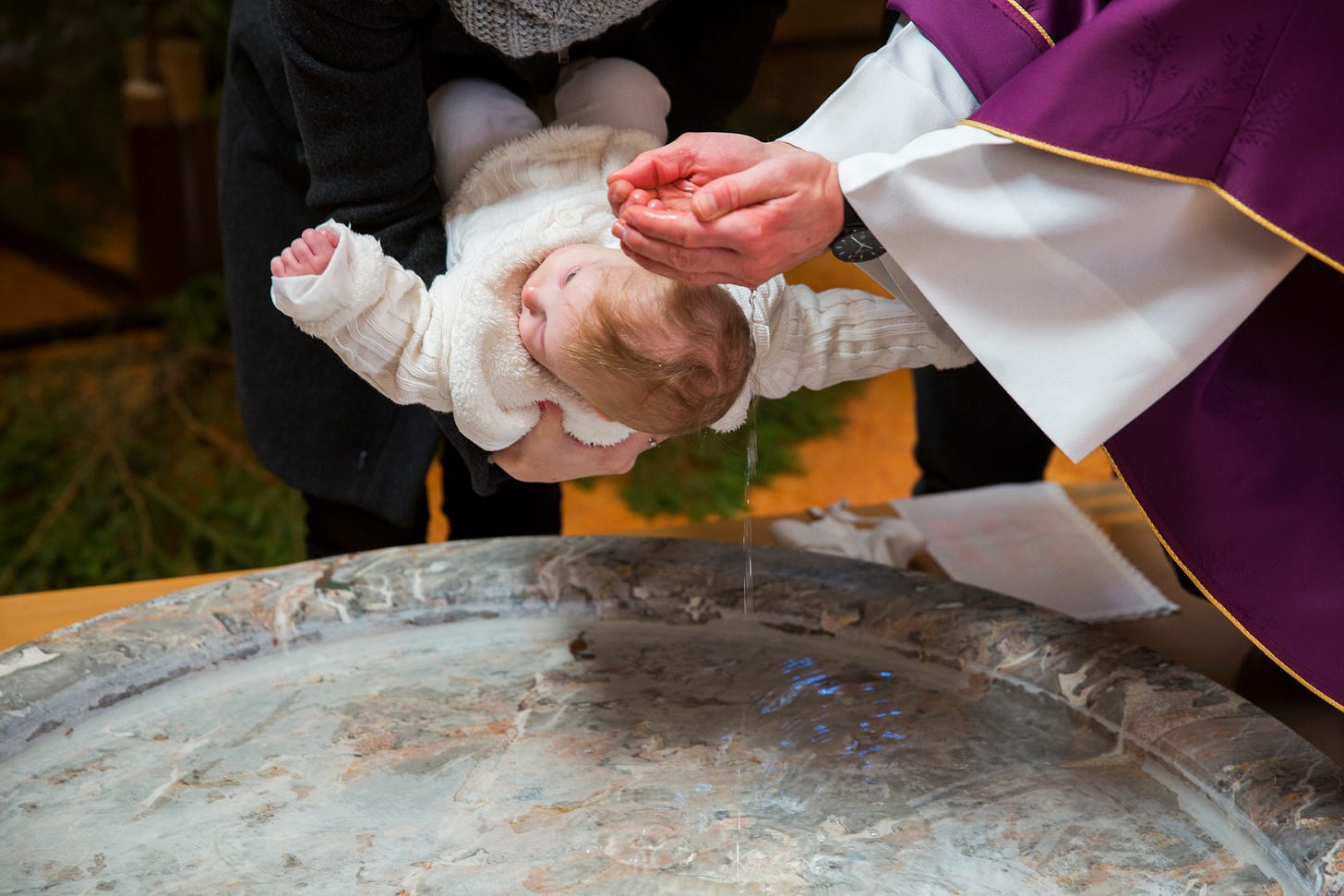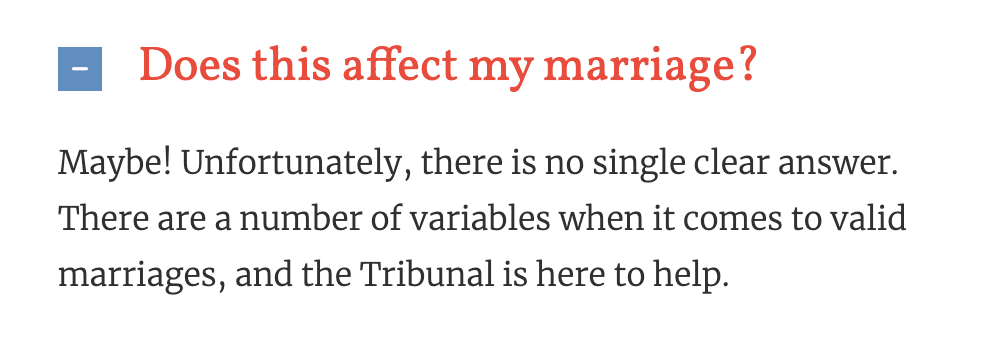
On Monday, it was widely reported in mainstream outlets that a Catholic priest in Phoenix, AZ had incorrectly performed thousands of baptisms over 20 years in several congregations whom he served (originally reported by Kevin J. Jones for the Catholic News Agency earlier this month).
The priest—whom I will not name here because at this point, in light of his resignation and heartfelt anguish, it feels cruel to do so—had unintentionally substituted a single incorrect word while presiding over these baptisms, stating “we baptize” rather than “I baptize” as so directed by the Vatican.
He used the wrong pronoun in a very important context, and this has had far-reaching consequences.
This was an innocent goof that, somehow, had gone unnoticed—or perhaps unchecked by those few who had noticed—for two decades, which is fairly astonishing in itself.
In the Catholic Church’s doctrine, baptism is deemed essential for the salvation of the soul, and thus, based on that small but important requirement alone, thousands of Catholic adults are understandably concerned for what this means for the salvation of themselves and their children.
I’m going to briefly pause here and recognize that many of you, my dear and loyal readers, are atheist or agnostic, let alone not-at-all religious, and may find this all quite absurd. Even as a Christian myself, I had one of those involuntary, shocked laughs when I first saw the headline. It seems like it came straight out of The Onion.
So, before I continue with the rest of this, here’s what I’ll offer to you as a possible exploration of this topic: there are many Catholic families who are incredibly progressive, pro-choice, pro-LGBTQ, supportive of a complete separation of Church and State, highly critical of the hypocrisy of the Church, whilst simultaneously quite invested in the importance of the Catholic faith and tradition in their own lives.
Do you get what I’m saying? For all the horrors of religion that any reasonable adult should be led to recognize and prevent, honoring the integrity of faith in one’s personal life—and its importance to one’s family—is a priority for countless religious progressives.
So, yes, while I understand that this may seem to many of you like losing a million dollars in Monopoly money (“who the hell cares?”), I can assure you that these families are being confronted with some very traumatic news that can be disorienting and destabilizing, to put it lightly.
But it gets worse because this is about far more than botched baptisms. The Catholic Church has seven sacraments, and six of those all require baptism (the first of the seven) in order to be valid. For example, sacramental recognition of a marriage by the Catholic Church requires both persons be baptized. Receiving the Holy Communion requires baptism in the Catholic faith (even those of us who are Christians but baptized as Protestants cannot receive it). So does Confirmation. So does properly confessing to—and receiving counseling from—a priest in order to be reconciled. And so on and so on…
The spiritual health of a Catholic who is aligned with the Church’s doctrine, their identity as a faithful and compliant servant of God and to their fellow Catholic, rests on that initial act of faithful submission: the baptism.
Thus, there are thousands of Catholic families who are understandably wondering over the past month if their marriages are valid, if their child’s soul has been saved, if their communions are true, etc.
It’s a whole ass mess, and thus far, the Church has been less-than-clear on the implications of these thousands of non-baptisms. For example, in the FAQ published by the Catholic Diocese of Phoenix, here was the answer from Church officials on whether a botched baptism affects the validity of one’s marriage:
“Maybe!”
Here’s a pro-tip for anyone in communications: when the subject is one’s soul, a good bedside manner can go a long way and typically does not conclude flippant waffling.
As a trans woman in a country that has been consumed in recent years by countless bad faith discussions on respecting the authenticity of pronouns—indeed, a national discourse that has not been helped by the callous and irresponsible statements of some Catholic clergy whom seem to be obsessed with invalidating trans and non-binary people—I find this all a bit ironic.
I fully understand how much it hurts, how much one’s happiness and health can be impacted, when the wrong pronouns are used in the eyes of God and the whole world.
I genuinely feel bad for these families who have been impacted and certainly for this priest, who has gone through his own personal hell over all this since it was revealed.
It is very easy for me to understand why all these families would be upset over this, and it costs me absolutely nothing to offer sympathy to them in this situation and acknowledge why this is traumatic for them. And so, I do.
At the same time, I am led to wonder why it is so difficult—and why such a great cost is presumed, despite lack of reasoning to justify the existence of a cost—for the Catholic Church’s leadership to understand the respect and dignity inherent in authentic pronouns for a trans or non-binary person.
In August, the Catholic Diocese of Arlington (Virginia) found time to release a document urging Catholics to refuse acknowledging and using the authentic pronouns of trans and non-binary people because, in the words of Bishop Michael Burbidge, transgender and non-binary people do not exist.
Around the same time, Catholic high schools in Chicago made news for announcing they would not be asking for the preferred pronouns of students, essentially making a commitment to discriminate against trans and non-binary children.
There are many more of these, of course, and along with them no shortage of op-eds and social media rants from prominent conservative Catholics who have kept a steady drumbeat of transphobia in recent years.
And yet, here’s an interesting plot twist: although the Vatican has released anti-trans guidance on the validity of the trans and non-binary community, it has not yet ordered Catholic institutions to reject authentic pronouns for trans and non-binary people. In fact, some Catholic institutions appropriately accommodate authentic pronouns.
This means that of all the issues to which Catholic leadership could dedicate time and energy, there are some Catholic leaders who are going out of their way to discriminate against trans and non-binary people, despite it not being a doctrinal imperative.
Including…. the Catholic Diocese of Phoenix, which I was sad to find has issued numerous statements and promoted podcast episodes (yes, podcasts) denying the validity of trans and non-binary people and rejecting respect for us in the public square.
Where do I find the capacity for empathy for people who clearly have no empathy for people like me?
I turn to Christ, who was asked what is God’s greatest commandment and answered with a principle echoed throughout Scripture:
“‘Love the Lord your God with all your heart and with all your soul and with all your mind.’ This is the first and greatest commandment. And the second is like it: ‘Love your neighbor as yourself.’ All the Law and the Prophets hang on these two commandments.”
I can only hope the Diocese of Phoenix, in the midst of fixing this mess and invalidating trans folks in their spare moments, can find the time to read that.
Hi, I’m Charlotte Clymer, and this is Charlotte’s Web Thoughts, my Substack. It’s completely free to access and read, but if you feel so moved to support my writing, please consider upgrading to a paid subscription: just $7/month or save money with the $70/annual sub. You can also go way above and beyond by becoming a Founding Member at $210.















Share this post